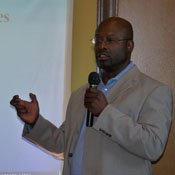Communicating positive messages about Jackson's progress and ending negative perceptions about crime is important to attract new residents to the city of Jackson, Jackson State University professor B. D'Andra Orey told a group of citizens this morning.
"You might know (people) who actually moved out of the city, but those are anecdotal cases, and you can't make those inferences based on those few cases that you know," Orey said about conclusions drawn from the 2010 Census. "It's the same with crime. A murder might have taken place a few weeks ago--that one murder. So we tend to sometimes have perceptions that don't equate with reality."
Speaking at Koinonia Coffee House's Friday Forum, Orey gave a presentation on the 2010 U.S. Census data to approximately 30 community members. The presentation is part two of a series on the impact of Census data that revealed Jackson's population dropped 5.8 percent over the last decade, from 184,256 in 2000 to 173,514 in 2010. Unreported by many local media outlets, however, is that Jackson's population loss has slowed from the previous decade, which showed that the city lost 6.3 percent of its residents from 1990 to 2000. The Census also revealed that Jackson's black population increased by 26 percent from 1990 to 2010.
Orey pointed out that Jackson was not the only city in the metro area to see an increase in black population. From 1990 to 2010, Madison County reported a 53 percent rate-of-growth increase in black residents and Rankin County reported an 83 percent increase.
Perceptions of inadequate public education and high violent crimes are two challenges the city must overcome to bring more people to the city, Orey said. Using data from the Jackson Police Department, Orey displayed a graph showing house and auto burglaries as the highest incidents of crime for March 7 through 11.
"I think we, in Jackson, need to do a better job of branding the fact that we don't have these murders and rapes taking place," he said.
Orey, along with JSU visiting professor Leniece Davis and sociology professor Thomas Kersen, suggested that community members create a coalition to rebrand the city made up of city officials, business elite members, social justice advocates, and citizens of various ages and ethnicities.
Thomas cited the most recent 2007 "Cities Ranked and Rated" report from Sperling's BestPlaces.net, showing that Jackson's violent crime was below the national average. Jackson scored high for its low cost of living, and its arts, culture and health care. Overall, the city ranked 98 out of 373 cities.
"We should think about what we are good at in Jackson that maybe Madison and Clinton and those folks don't have, and that could be part of the rebranding process," Kerson said
After the presentation, Parents for Public Schools Executive Director Susan Womack said she would like to see more dialogue for community members to understand that the Mississippi Department of Education's "Academic Watch" average ranking for Jackson Public Schools is the equivalent of making a C on an exam.
"We need to stop talking about Jackson Public Schools as a failing district and talk about it as a big urban district, under-resourced, that has a lot of work to do," she said.



Comments
Use the comment form below to begin a discussion about this content.